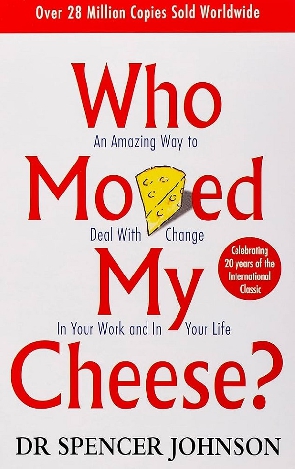Change is the central message preached in the book ‘Who Moved My Cheese.’ The fiction tackles the reservations generations have had about ‘change.’
Four imaginary characters in dire search of cheese in a maze were used by Dr. Spencer Johnson. Two little people, Hem and Haw, would find cheese at station C and wouldn’t see the need to find more cheese.
Soon, things got changed; there was no more cheese at Station C. Instead of reacting to the change they started complaining. Sniff and Scurry, the two mice, however, would run through the maze station in search of more cheese when there was no cheese at station C.
‘Maze’ is by far the challenge in life. Whereas ‘cheese’ has a lot of hidden meanings inferred from the story. It connotes employment, promotion, a good spouse, or anything that could give the satisfaction that we seek. How do we react after acquiring such?
And should we lose it; what would be our response to the change? It will shock you to know the degree to which people are averse to change. Everything about change doesn’t auger well for them, even if it’s the best alternative. The below would therefore help in overcoming the anathema to change. Know
Your Personality: Many are those who are alive but are yet to know their temperament, if they’re Sanguine, Choleric, Melancholic, and Phlegmatic, as suggested by Tim Halaye in his book “Why You Acted The Way You Do.” So, whenever they’re faced with change they get bathed in a dilemma.
The book spelled out four traits and how they responded to change. Are we ‘Sniff’, who could sniff out change? Or ‘Scurry’, who would at all times want to scurry her way into action? Maybe we are Hem — that we deny and resist change — our phobia of change makes us think that change may lead to something ominous.
And finally, Haw, we would learn to adapt in time with change, if there’s something positive out there. Which of these traits do you possess? Knowing yourself is the fulcrum for embracing change.
Do Not Be Too Comfortable: We are too comfortable in our comfort zones. Comfortability is inimical to change. Be content but don’t be too comfortable.
When Ham and Haw located Cheese Station C, they gave in their search for more cheese, thinking that the sweetest and unlimited is what they’ve found. They came to build a social life around it, in order to frolic, unbeknownst to them, in their newly found fool’s paradise.
Put Your Brain To Work: Don’t render your brain useless; use it to think. There are people who allow their stomachs to do the thinking once they get a little to eat. They forget tomorrow just in the case of Ham and Haw. The abundant supply of cheese at their disposal befooled them that they’d wake up and always find cheese at station C.
Imagine if they had reasoned that the cheese could get exhausted, wouldn’t they have put in place measures to react to the change of no cheese? That’s how we shall all be surprised by ‘change’ when we refuse to think with our heads. We will thus yell: “Who Moved My Cheese” as Hem did after finding out that there was no more cheese.
Proactive Rather Than Reactive: For Scurry and Sniff they had always gone around Station C and had had to prepare since they knew the cheese could get to finish. Thus, when it eventually finished they brought their shoes up and began to move far beyond station C in search of new cheese.
They knew change had come so they embraced it and made possible moves. Some of us are like Ham and Hew, whom when change came forced themselves too much not to believe nor accept it. We need to be prepared for change; even life can’t do away with change. Everything changes, including people.
Focus More On Solution: “Problem no dey finish.” They may come: what would make us stand out is how we would find solutions to tackle those problems. Remember Scurry and Sniff left in search of new cheese, but Hem and Ham stood at Station C and began pampering their pain of losing the cheese.
Meanwhile, the cheese was long gone. They focused on the problem without finding a solution. Don’t be like them; let your thinking, in times of change, go outside the box without remaining in the box of the problem.
Have a Contingency Plan: Because change may come unexpectedly, it’ll be prudent to make way for ‘Plan B.’ Always draw a contingent plan; it will help you to gain control over change. In the case of Hem and Haw, they had no contingency so they left home discouraged and dispirited when they had no supply of cheese.
And this would later inform them to write on the wall: “The More Important Your Cheese Is To You The More You Want Hold On To It.” Always remember to keep an alternative so that when there’s change you won’t lose your cheese.
Live A Responsible life: God wouldn’t do by miracle what you need to do by responsibility. Be responsible. Have yourself to blame, not others (or otherwise), like Hem crying out, “Why did they do this to us,” instead of running in search of new cheese stations.
Once you blame yourself for everything that happens to you, you’ll be compelled to be proactive and optimistic. You make plans for change before the change would plan for you.
Zero Arrogance: Pride is a plot of the foolish. Times that prideful people may need help that’s when they think they’re too big to seek for guidance. Had Hem and Haw not seen Scurry and Sniff as “just mice”, they’d have appreciated the strides they had made and would have followed suit. Sometimes we grit too much to our prestige and we lose everything. Ego wants you to raise your shoulders by belittling everyone else. And it’ll swallow you down into the earth.
Change Is Inevitable: Change is the lyrics for good music. When we embrace change we realize that we’ve embraced something good. Scurry and Sniff later found cheese station N which had the best of cheese and it was in limited supply. Similarly, Haw, who later disregarded his reservations towards change and moved in search of a new cheese, found ‘Station N,’ too, and saw that:
“After every hardship comes ease.” Therefore, change is an illusion that you can’t do it after losing. ‘It’s only a fool,’ as it is said, ‘who doesn’t change his mind.’
Risk A Little More: Life is full of risk. Take risk. You ‘either get rich or die trying’ as said by 50 Cent. Even when Scurry and Sniff had gone in search of new cheese, they had to take some risks before finally locating ‘Station N.’ People who detest change tend to be risk averse:
Risk isn’t evil. When you don’t risk it, you lose it, or would fail to learn, or get something new. Take risk. Haw told Hem to let go of what was lost and try risking it for something new, but he dissented. And he brought up thousands of reasons why risking won’t make sense like you and I do whenever we meet change face to face.
All we need to learn from the book is that noticing small changes in every aspect of our lives early helps in adapt to a bigger change that is yet to come. And that change is difficult but change is good.
Opinions of Monday, 16 October 2023
Columnist: Abdul Rahman Odoi















